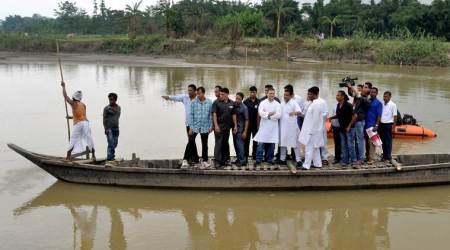 Lily Goswami, ailing, lies on a makeshift cot at Sonari-Kamakhya MV School in Assam, now a flood relief camp. Express photo by Dasarath Deka
Lily Goswami, ailing, lies on a makeshift cot at Sonari-Kamakhya MV School in Assam, now a flood relief camp. Express photo by Dasarath Deka
When people of six to seven villages near Jakhalabandha, Assam, fled after the Brahmaputra broke 100 metres of its embankment at Hatimura, Gobinda Goswami, 62, and his family had a difficult task at hand.
His mother Lily Goswami, in her 80s, is bedridden. By the time he could go out in the dark and cut down three banana trunks to make a raft, the water in his house was waist-deep. “We put her on the raft with great difficulty and pushed it until we reached the road. I don’t remember who provided us a handcart to bring her to this relief camp. I thank God she is still alive,” said Goswami.
His mother has been lying on a makeshift cot made by joining two benches of Sonari-Kamakhya MV School, which has become a relief camp since August 12. “She cannot get up, even chew. We are giving her liquid food. She has become so weak that she can hardly speak,” said her daughter-in-law Bharati.
“We could not bring anything. My sister and I have lost all our books, and the certificates I had got in a singing competition,” said Pompi, 12, sitting beside her grandmother. She is in class VII at Hatbor Girls’ High School and her elder sister Bhagyashree in class X, with board exams due in February.
A medical team came to the camp for the first time Tuesday. The doctor wanted the elderly woman taken to a hospital in Tezpur, but her son refused. “I cannot manage, with not a rupee at hand,” said Gobinda Goswami, who used to sell vegetables.
Kalpana Gohain, who came from Dulal-Madhab village, worked as a midday meal cook at Madhab Middle School. “Our kutcha house was washed away in front our eyes,” she said. “My husband lost the small shed where he used to sell broiler chicken. All our papers were in a plastic bag hanging from a bamboo pole, but today my husband went and found our house itself has gone.”
Kalpana and others are helping the local Rainbow Youth Club prepare food for the camp. The club has arranged for two gas stoves, paper plates and plastic glasses. The district administration has provided rice and dal, while other sources too have helped.
On Tuesday, a group of teachers and students from Nowgong Girls’ College came with soap, sanitary napkins, baby food and other items, apart from rice, dal and salt. “We have cancelled our freshers’ union of August 17 and bought these items,” said Shanti Dey, general secretary of the students’ union. “The fund of Rs 35,000 for the event was sent on these items, faculty members contributed an equal amount, and the alumni association Rs 10,000 to make it about Rs 80,000,” said Amiya Patar, who teaches Assamese.
The school has only one toilet unit for 1,200 inmates; residents of Sonarigaon and adjoining Kamakhya village have let the people use their toilets and bathrooms. “After all they are our own people,” said Krishnaraj Hazarika, whose house is next to the school.
Around 9 pm, Water Resources Minister Keshab Mahanta, the local MLA, arrived and a dozen children gathered around him. “We have lost our books, schoolbags, uniforms. Will the government provide us with these?” said Labanya Roy Choudhury of class VI. “Will I be able to go back to school?” said Utpal Mahanta of class VIII. The women asked the minister how to rebuild their houses.
Kaliabor subdivision of Nagaon district has had no electricity since August 12 midnight. Fearing electrocution, the authorities have shut down supply indefinitely, and candles are the only source of light in this camp.
A Guwahati-based NGO had brought 600 eggs, which the 1,200 inmates shared.

